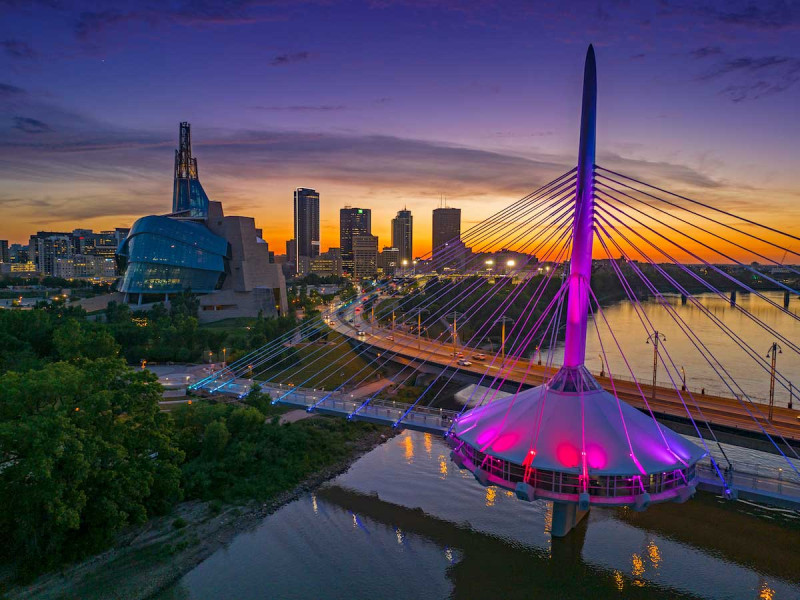Welcome to Your New Home in Winnipeg

Discover the essentials of settling in Winnipeg, Manitoba
Welcome to Winnipeg, the bustling heart of Manitoba and a city that has earned a reputation as one of Canada's most welcoming destinations for immigrants. Whether you're arriving with aspirations of career advancement, academic pursuit, or simply to build a better life for your family, Winnipeg offers a vibrant community ready to embrace you. This comprehensive guide is designed to help you transition smoothly into your new life in Winnipeg, providing insights into housing, employment, healthcare, education, and more.
Finding Housing in Winnipeg
One of the first steps in settling down in Winnipeg is finding a place to call home. Fortunately, the city stands out for its affordable housing options compared to other major Canadian urban centers. Whether you're looking to rent or buy, Winnipeg has something to offer for every budget.
Renting in Winnipeg
Renting is a popular choice for newcomers seeking flexibility. The average cost of a one-bedroom apartment is approximately $1,200 per month, while a two-bedroom home typically rents for around $1,500. Popular neighborhoods for newcomers include:
- Downtown: Ideal for those who want to be in the heart of the action, close to work and entertainment.
- St. Vital: Known for its family-friendly environment, parks, and excellent schools.
- Fort Garry: A favorite among students and professionals due to its proximity to the University of Manitoba.
To find rental properties, platforms like Kijiji, RentBoard, and local Facebook groups can be invaluable resources.
Buying a Home
If you're considering a more permanent stay, buying a home is a viable option. The average home price in Winnipeg is around $350,000, making it an attractive market for first-time buyers.
Job Market and Employment Opportunities
Winnipeg boasts a robust economy with opportunities across various sectors, making it an attractive destination for job seekers. Key industries include healthcare, technology, education, and manufacturing. High-demand positions are often found in:
- Healthcare: Nurses, doctors, and caregivers are consistently in demand.
- Technology: IT specialists and software developers find many opportunities here.
- Skilled Trades: Electricians, welders, and mechanics are sought after.
- Retail and Customer Service: These positions offer a great entry point for newcomers.
For job hunting, government resources like Job Bank Canada and Manitoba Start, alongside recruitment agencies such as Pinnacle and David Aplin Group, provide excellent starting points. Additionally, networking events and job fairs organized by immigrant support organizations can help you connect with potential employers.
Understanding the Cost of Living
Winnipeg's affordability is one of its biggest draws. The cost of living is significantly lower than in cities like Toronto or Vancouver. Here’s a quick overview of typical expenses:
- Housing: As mentioned, renting ranges from $1,200 to $1,500 for a one-bedroom.
- Groceries: Expect to spend between $400 and $600 monthly for a family of two.
- Public Transportation: A monthly bus pass costs $104.
- Utilities: Average around $150 to $200 per month.
By managing your budget wisely, you'll find that Winnipeg offers a comfortable lifestyle without breaking the bank.
Navigating Healthcare and Insurance
Healthcare is a priority for newcomers, and Manitoba provides free healthcare to permanent residents and certain temporary workers. Upon arrival, applying for a Manitoba Health Card should be a top priority. This card entitles you to:
- Doctor visits
- Hospital care
- Medical tests
However, note that dental and vision care often require additional private insurance. Winnipeg is home to several hospitals and clinics, including the Health Sciences Centre, the largest hospital, and Victoria General Hospital, known for its family medicine services. For non-emergency needs, walk-in clinics are readily available.
Education and Schools
For families with children, education is a crucial consideration. Winnipeg offers a range of public and private school options, with education being free for residents up to Grade 12. Notable school divisions include:
- Winnipeg School Division
- St. James-Assiniboia School Division
For higher education, institutions like the University of Manitoba and Red River College provide excellent academic programs. Newcomers can also benefit from free English language programs offered by organizations such as WELARC and MITT.
Public Transportation and Commuting
Winnipeg's public transportation system is efficient and affordable. Winnipeg Transit operates an extensive bus network across the city, with fares set at $3.15 per ride or $104 for a monthly pass. For those who prefer eco-friendly commuting, the city's expanding network of bike paths offers a great alternative. If driving is your preferred mode of transport, ensure you obtain a valid driver's license through Manitoba Public Insurance (MPI), which also handles vehicle registration.
Community and Support Services
Settling into a new city can be challenging, but Winnipeg offers numerous community and support services to ease your transition. Key organizations include:
- Manitoba Start: Provides job search assistance and resume workshops.
- Immigrant Centre Manitoba: Offers language classes and community integration programs.
- Neighbourhood Settlement Services: Assists with housing and healthcare navigation.
Weather and Climate: Embracing the Seasons
Winnipeg experiences four distinct seasons, each with its own charm and challenges. Winters (December to March) can be particularly harsh, with temperatures dropping to -30°C, making warm clothing essential. Spring (April to June) brings mild, rainy weather, while summer (July to September) offers warm temperatures that can reach 30°C. Fall (October to November) is cool and crisp, perfect for enjoying the city's vibrant foliage.
Conclusion
Winnipeg is a city that opens its arms to newcomers, offering a blend of opportunity, affordability, and community support. By understanding the key aspects of life here—from housing and employment to healthcare and education—you can make your transition to Winnipeg smooth and successful. Embrace the journey, and soon, you’ll find that Winnipeg is more than just a place to live; it's a place to call home.
